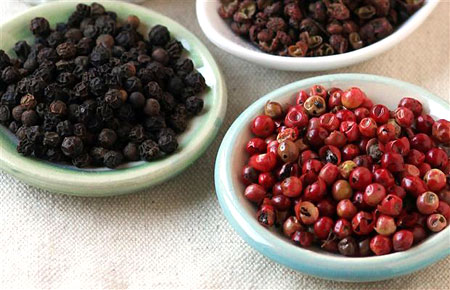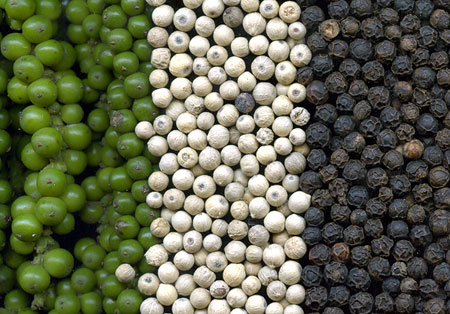Black pepper (Piper nigrum) is one of the oldest spices in the world. The Greeks used it 2500 years ago. In the Middle Ages, only the very rich could have this precious spice. Often, a tribute was paid in black pepper.
Black pepper is a native plant of West Indian and Burmese areas. Extremely widespread throughout Southeast Asia, it grows in wet equatorial areas, with little seasonal variation. The wild plant similar with a liana stretches by up to 10-15 m tall trees.
Black pepper subspecies may include:
Longum – India, Hymalaya, Ceylan
Retrofactum – Indonesia, Malaysia
Saigonense – Vietnam
Clusii and Guineense – Africa
This plant is cultivated for a long time in the form of a creeper which is fixed with a few frames. It has oval leaves, flowers, fruits in grain form, of 4-10 mm in diameter. Fruits pass through a range of colors from green to red and then black.
Green pepper is conserved in a water-based solution. Black pepper is the powder of the dried fruit. White pepper is the result from the mature fruit, but treated with water to expose the coating and then dried.
Properties of black pepper:
Its flavor is from the essential oil of terpenic carbides, found in 1 to 3% in the fruit. The burning flavor is mainly due to an alkaloid and some amides, which reach up to 10% of weight.
It is a spice that helps digest fats and sugars. Piperida is antidepressant, helping to relax the nervous system. Derivatives of this molecule have been experienced in Asia in treating epilepsy.
This plant is often part of Indian medicine drugs, but in Europe is no longer considered a drug, due to its use as a culinary spice.
Uses of black pepper:
It was used in protecting the plague, venereal disease or fever. It is considered an aphrodisiac and is a culinary spice that stimulates appetite, flavor foods and improves digestion in case of heavy meals. However, this spice should be used sparingly, because misuse of pepper can lead to gastrointestinal disorders, toxic gastritis and hemorrhoids crisis.


